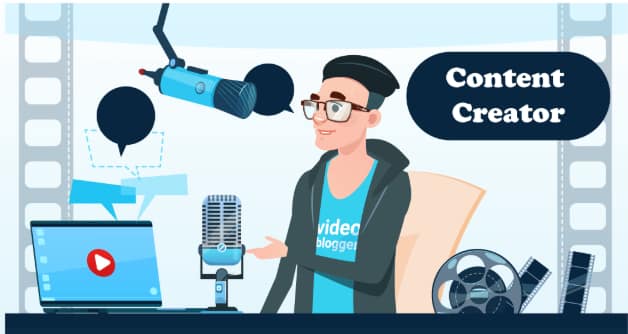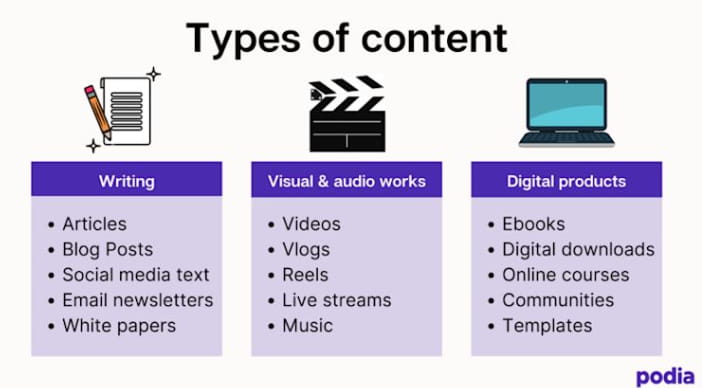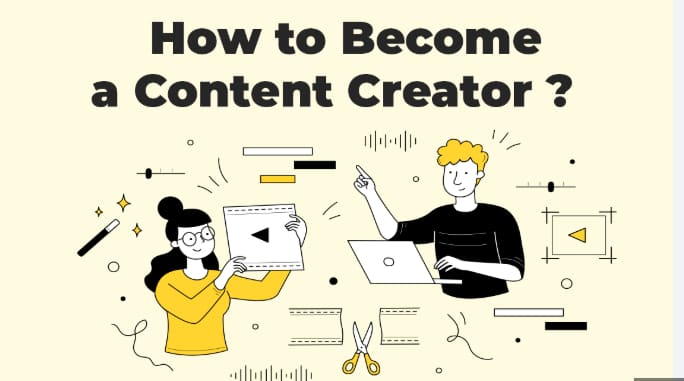Contents
In today’s world where globalization has reached its peak with technology, we all accept that digitalization has also encompassed every aspect of our daily lives. From the social media feeds we first look at when we wake up in the morning, to the podcasts we listen to during our breaks, from the YouTube videos we watch in the evening to the blog posts we read on a topic we are curious about…
Our world is full of digital content, isn’t it? So, who prepares all these articles, videos, visuals, and audio recordings? Here is the “Content Creator“, as it is popularly called recently! Maybe you are one of them, or maybe you are just curious about what they do. Let’s discover together in a sincere conversation who these famous “digital content producers” are, what they are, and what they do. In this article, we will uncover the secret curtains of these creative minds of the digital world!
A content creator is a professional who prepares regular and effective posts in a wide range of areas, from written text to video, graphic design to podcasts. Their job is to inform, entertain and create interaction with the audience. In this article, we will discuss who a content creator is, how they work in which media, and all the details from their job description to the tools they use, in a friendly manner. Moreover, we will also give useful tips to those who want to step into the sector. So, if you also want to step into this new trending profession, we are sure that you will find useful information in this short analysis.

After all, there is almost no one in Generation Z who is not interested in these new trending professions. If you are ready, let’s meet the architects of creativity in the digital world and take a fun journey behind the scenes of the “digital content creator” role!
Who Exactly Is a “Content Creator”?
Although the term ‘Content Creator’ doesn’t have a single, universally accepted definition, it generally refers to anyone who produces digital material—whether articles, videos, images, or audio—for online platforms such as blogs, social networks, YouTube, or podcast channels.
In other words, a blogger, a YouTuber, an Instagram influencer, a podcaster, or even a copywriter crafting compelling marketing copy are all content creators at their core. Their shared goal is to provide information, entertainment, or inspiration to their audience.
But content creation goes beyond merely publishing material online. These professionals strategically plan and craft content to reach specific target audiences and achieve defined objectives—be it educating viewers, sparking discussions, or driving conversions.They aim to create value with the content they produce. In other words, they do not only think about producing, but also about ensuring that this content serves a purpose and reaches the right people. In this way, they emerge as people who increase the sales of the companies or organizations they work with.
We can see very different profiles under this “content creator” hat. While some do this as a hobby, some earn their living by working freelance. Some work within a brand or agency to produce corporate content, while others create their own personal brand and appear before us as “influencers”. In other words, when we say “content producer”, we are not talking about a single mold; this is a very large and colorful community.
Ultimately, content creators are the architects of our digital experience, weaving together creativity and strategy to shape the way we consume information and entertainment on the internet.

What a Content Creator Do? A Day in Their Workshop
Before we get into the topic, we should know that the job of a content creator is not just about speaking in front of the camera or sitting in front of the keyboard and writing. The kitchen of this job is quite active! Everything usually starts with an idea. Questions such as “What will I produce content about?”, “What will interest my target audience?”, “In what format can I best explain this topic?” are brainstormed. Then comes the planning stages such as research, concept development and creating a content calendar. In other words, as in almost every subject, the first step here is solid planning and brainstorming.
A content creator’s work starts long before pressing the ‘record’ button or typing the first word. It begins with brainstorming: ‘What topic will resonate with my audience?‘, ‘Which format best conveys this message?’, and ‘How can I make this content unique?‘ Once an idea takes shape, creators research, outline, and schedule their content using editorial calendars. This planning phase ensures consistent publishing and aligns with important dates, trends, or campaigns.
The creation phase varies by format: video creators write scripts, record footage, and edit; writers draft and edit articles, add images, and optimize for SEO; podcasters record, edit audio, and add sound effects. Each format demands its own set of skills.
After production, content enters post-production: color correction and sound mixing for videos, grammar and readability checks for written content, and formatting for infographics.
Finally, the prepared content is ready to meet the target audience! The content must be published on appropriate platforms (YouTube, blog, Instagram, Spotify, etc.) and optimized with the right title and description. But the job does not end with publishing; promoting the content, sharing it like a social media expert, and responding to comments and questions and interacting with the community are also among the duties of the content producer. In other words, they manage the entire process from production to promotion and interaction. Sometimes you will also need to be a software developer or data analyst.

What Types of Content Creators Are There?
Content creation is such a broad field that naturally different areas of expertise and types have emerged over time. In this context, it should be noted that the most common distinction is usually made according to the format of the content produced.
- For example, those who mainly produce video content are called “Vloggers” or “YouTubers”, those who produce written content are called “Bloggers” or “Copywriters”, those who produce audio content are called “Podcasters”, and those who produce visual content (photos) are called “Photographers” or “Instagrammers”. Each format requires its own dynamics and skill sets.
- Another distinction can be made according to the platforms on which content creator is active. For example, a content producer who focuses entirely on YouTube is called a “YouTuber”, while those who share impressive visuals and stories on Instagram are known as “Instagrammers” or “Instagram Content Producers”. Similarly, TikTok phenomena, those who share professional content on LinkedIn or Twitch broadcasters can be given as examples of platform-specific content producer types. While some producers focus on a single platform, some can be active on more than one platform.
- The subject or niche they specialize in is another way to classify content producers. In these days when you can wave your hand and bump into a content producer, focusing on a specific area can make a difference. For example, there are names that produce in very specific areas such as “Game Content Creator”, “Beauty and Makeup Content Producers”, “Technology Content Producers”, “Food and Gastronomy Content Creator” or “Education Content Producers”. This niching allows for a deeper connection with the target audience.
- Between us, many content creator today actually wears more than one hat at the same time. In other words, it is very common to see producers who shoot videos, write blogs, are active on Instagram and do podcasts. Cross-platform mobility and trying different formats are quite popular. Therefore, although these classifications are not strictly separated, they help us understand how diverse and colorful the world of content production is.

How Can You Become a Content Creator?
Now it’s time to look at the requirements of this popular profession. In fact, there is no specific pattern to doing this job. In other words, anyone who improves themselves and is interested can become a content creator. On the other hand, we have listed some of the programs and approaches required at the most basic point below.
- Tool Knowledge and Education: Learning popular content creation and analysis tools such as Canva, Adobe Creative Cloud, Final Cut Pro, WordPress, Google Analytics will put you one step ahead. Strengthen your CV with online courses and certificates.
- Start Your Own Projects: The best way to gain experience is to practice by actively using your own blog, YouTube channel or social accounts. Real cases enrich your portfolio.
- Interaction-Focused Approach: Constantly communicating with the audience, responding to comments, organizing surveys and listening to feedback allows you to create a loyal follower base. Interaction also increases visibility.
- Continuous Learning and Adaptation: Digital trends change rapidly. Be informed about new formats, platforms and algorithm updates. Staying flexible and not being afraid to experiment is the secret to being a successful content creator.

Content Creator Salaries: What to Expect?
The salary is the most curious topic. If you are a content creator working full-time in an agency or company, such as copywriter, blog editor, social media content manager or video producer, your salary is usually similar to other digital marketing roles in the market (social media specialist, digital marketing specialist). Depending on your experience, area of expertise (such as video editing, SEO writing) and the size of the company you work for, you can expect to see salaries ranging from $20,000 to $30,000 net globally in 2025 at entry and mid-level levels (0-5 years of experience). Of course, these figures will increase even more in more senior roles or niche specializations.
However, things are completely different for self-employed, i.e. independent content producers (YouTubers, Instagram/TikTok influencers, those who earn income from their own blog/podcast, etc.). It is almost impossible to talk about a fixed salary here. Earnings; It is based on a variety of factors such as advertising revenues based on viewing/listening numbers (AdSense, Spotify ads, etc.), brand partnerships and sponsorship agreements, product/service sales (own brand or affiliate marketing), follower/viewer donations. Therefore, monthly income can start from almost zero and go up to tens of thousands, hundreds of thousands of USD (and even much more!).
The secret to success here lies in original content, creating a loyal audience, understanding platform dynamics well and entrepreneurial skills. Therefore, it would be misleading to state an “average salary” for content producers in this group, because each of their earning stories is completely unique.
Here it is! The people we call “Content Creator” is actually like the invisible heroes of the digital world. They are creative minds who generate ideas, research, write, shoot, edit, publish and interact with us. These people, who do not fit into a single mold and create wonders in different subjects, make the internet a more knowledgeable, more entertaining and more colorful place for us.
Next time you’re reading a blog post, watching a video, or listening to a podcast, don’t forget to think about the hard work and creativity that goes into it! Who knows, you might be the next creator?
#seo
#contentmarketing
#contentcreator
